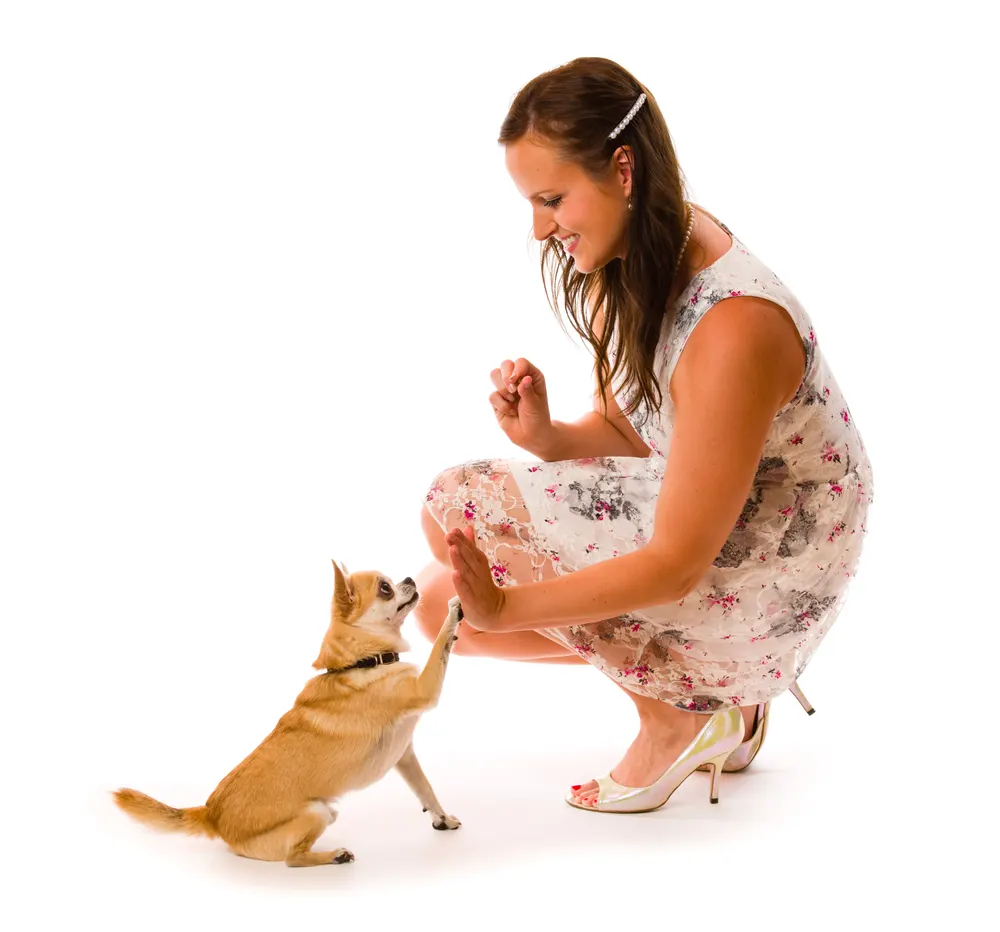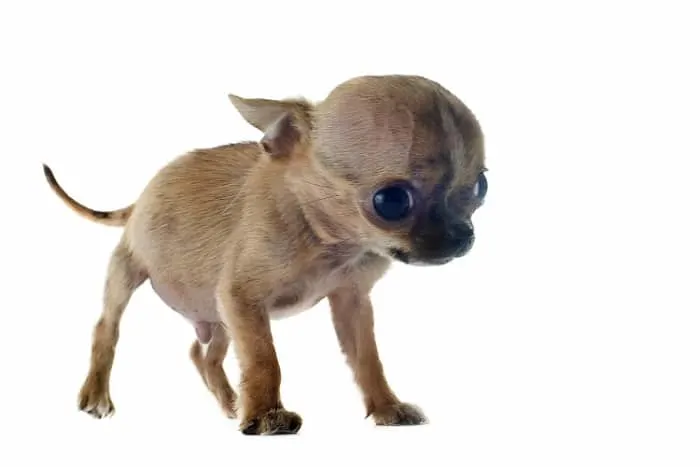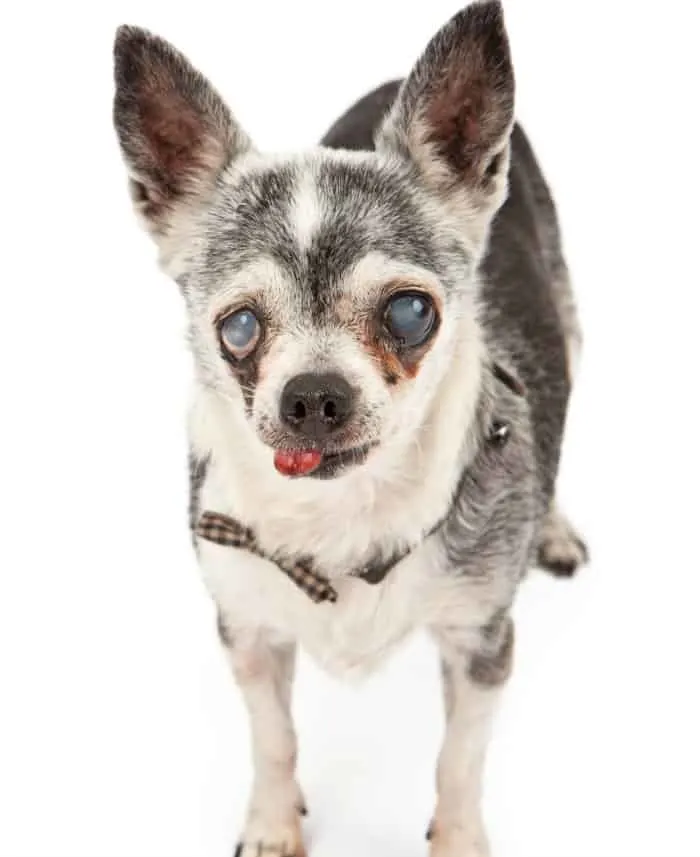Hey there, dog lovers! Ever wonder how big a Chihuahua’s brain is? You might be surprised by what we’ve found. These pocket-sized pooches have smarts that are truly mind-boggling.
People have been curious about Chihuahuas’ brain size for ages. Unpacking their thinking skills gives us a peek into the cool world of these teeny-weeny pets.
So, how much does a Chihuahua’s brain weigh? Around 55-56 grams, which is about 1.95-2 ounces. That may seem like peanuts compared to other dogs, but consider how tiny Chihuahuas are – they weigh between 2 and 6 pounds and stand only 6 to 9 inches tall!
This makes their brain-to-body size ratio one of the highest among all dogs. This contributes a lot to their cleverness and problem-solving skills.
Even with small brains, Chihuahuas have a super memory and are quick thinkers. They can learn and do many things, which makes them not just lovable buddies, but also surprisingly skillful given their size.
Chihuahuas may be small, but people often guess wrong about their brain size. It’s not smaller than other dog breeds.
Comparing Brain Sizes
All dogs, even Chihuahuas, have a similar brain size – about the size of a tangerine. The usual brain-to-body weight ratio for dogs is around 1:125, a ratio that stays the same across different breeds. A Chihuahua’s brain weighs around 55 grams (1.94 ounces), which is normal for dogs.
Special Features

The Chihuahua brain has a few unique traits that make it different from other dogs. While it’s not perfectly smooth, it does have a few identifiable bumps.
These special features may have something to do with how smart chihuahuas are and their strong personality. Even though they’re small, these pups are known for their amazing brains and bold character.
To wrap it up, a Chihuahua’s brain size is not as tiny as you might guess based on their body size. Chihuahuas’ brains are about the same size as other dogs, and their unique brain features could add to their smarts and personalities. These small pups keep surprising and wowing dog fans all over the world with their unexpected skills.
Chihuahuas are super quick thinkers and can learn and adapt to their surroundings. Their brain is about the size of a tangerine, around 2 1/4 to 2 1/2 inches wide. Even though they’re small, these dogs have an impressive memory and can figure out problems.
Typical Actions
Chihuahuas have a reputation for being lively and watchful, which makes them good watchdogs. They also really love their owners and can act protective if they feel scared. Some usual actions you might see from Chihuahuas include barking, digging, and being affectionate with their family members.
Training Struggles

Training a Chihuahua can be tough because of their small size and big personality. They might be stubborn and not want to follow commands without the right motivation. In a study done by Stanley Coren, Chihuahuas didn’t do great in the area of “Obedience Training”. However, obedience training is just one part of intelligence.
Chihuahuas are really good at adaptive intelligence, which means they can learn from their surroundings and solve problems. It’s important to be patient and use positive reinforcement when training these small, but clever dogs. Giving rewards and praising good behavior can help a lot in training Chihuahuas to be well-behaved buddies.
Health Issues Related to Brain Size
There are a few health problems that can come up because of their brain size. Here, we’ll talk about two health problems that are common in Chihuahuas and other small breeds: Hydrocephalus and Encephalitis.
Hydrocephalus

Hydrocephalus, also known as “water on the brain,” is a condition where cerebrospinal fluid (CSF) builds up in the brain, making the brain swell. This swelling puts pressure on the skull, which can cause a dome-shaped skull, open fontanelles, and other problems.
Chihuahuas are more likely to get hydrocephalus because of their small size and the potential for open fontanelles – soft spots on the top of the head where the bones haven’t joined together. Hydrocephalus in dogs might look like a swollen head, sunken eyes, seizures, and changes in behavior. It’s really important to catch this early and get treatment.
Encephalitis
Encephalitis, or inflammation of the brain, is another health issue that could affect Chihuahuas. It can happen in dogs of any size, but small breeds like Chihuahuas might be more at risk because of their compact head and brain size. Encephalitis can be caused by a bunch of things, like infections or an autoimmune response, where the dog’s immune system attacks its own brain tissue.
Some usual signs of encephalitis in dogs include fever, being tired, changes in behavior, seizures, and neurological issues. If it’s not treated, encephalitis can lead to severe complications, like brain damage or even death. It’s really important to catch it early and get treatment to help the dog recover.
It’s important for Chihuahua owners to know about these possible health problems related to brain size and to watch their pets closely for any signs of these conditions. Regular vet checkups can help find problems early and give better chances for successful treatment.
Senior dog dementia

Senior dog dementia, also known as cognitive dysfunction syndrome (CDS) or canine cognitive dysfunction (CCD), is a condition that can affect dogs as they get older. The exact cause of CDS isn’t totally understood, but it might have something to do with changes in the brain that happen with age, including a buildup of harmful proteins and poor blood flow. Small breed dogs, like Chihuahuas, are more likely to get CDS than larger breeds.
The usual signs of CDS in senior dogs include confusion, changes in behavior, and loss of appetite. Dogs with CDS might also change personalities, like getting irritable or not wanting to play as much. They might not respond as much to commands and might have trouble recognizing familiar people or pets. Some dogs with CDS might also have bathroom accidents or other changes in their bathroom habits.
While there’s no cure for CDS, there are some things you can do to manage the symptoms and slow down the disease. One of the most important things you can do is give your dog healthy food and regular exercise to help keep them physically and mentally healthy.
Your vet might also suggest medicine or supplements to help improve thinking function and manage symptoms like anxiety or depression. Plus, things like puzzle toys or interactive games can help keep your dog’s brain active and engaged.
In some cases, dogs with CDS might benefit from training or other types of therapy to help manage their symptoms. It’s important to work closely with your vet to create a treatment plan that fits your dog’s needs and to keep a close watch on their condition over time. With the right care, many dogs with CDS are able to maintain a good quality of life and continue to enjoy their golden years.
Helping Your Chihuahua’s Brain Health

Brain Stimulation
Just like us, Chihuahuas need brain stimulation to keep their minds sharp and healthy. Doing a variety of brain-challenging activities and playing with interactive toys can really improve your Chihuahua’s brain health.
Try adding puzzle toys or treat-dispensing toys to your Chihuahua’s environment. These toys encourage problem-solving and can make your Chihuahua’s brain work harder.
Interactive games like hide-and-seek or fetch can also let your pet think and learn while staying physically active.
It’s also really important to expose your Chihuahua to new experiences, places and smells often. This helps create new connections in their brain and improves their ability to adapt and think.
Physical Exercise
Even though Chihuahuas are a small breed, they still need regular physical exercise to stay healthy. Exercise is not only important for their overall wellbeing but it also helps their brain health.
Physical activity helps get more blood to the brain, bringing necessary oxygen and nutrients to support healthy brain function. It also helps create endorphins, which can lower stress and anxiety in your Chihuahua.
Some recommended physical activities for Chihuahuas include:
- Short daily walks
- outdoor or indoor playtime
- Agility or obedience training
By making sure your Chihuahua stays mentally stimulated and physically active, you can really help protect their brain health throughout their life.

Wrapping Up
To sum up, a Chihuahua’s brain size is quite impressive compared to their overall body size. An adult Chihuahua’s brain weighs about 55.10 grams, which is about the same size as a tangerine or orange. This makes them stand out among other dog breeds for having the largest brain-to-body size ratio.
Although some might argue that their intelligence depends on different things like training and environment, their brain size definitely shows their ability for learning and problem-solving. These tiny dogs are often underestimated but have shown themselves to be resourceful and adaptable buddies.
While their small size and large brain might be interesting, it’s really important to think about different parts of Chihuahuas’ health and care. As dog owners, it’s our job to provide a caring environment, proper training, and mental stimulation to help these smart little dogs thrive.


Cathy Bendzunas
Pet Blogger
